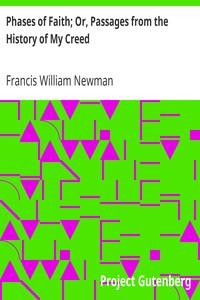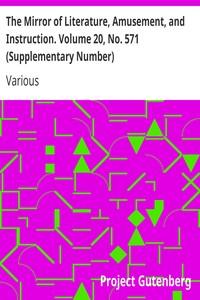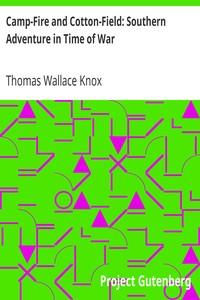Read this ebook for free! No credit card needed, absolutely nothing to pay.
Words: 89072 in 14 pages
This is an ebook sharing website. You can read the uploaded ebooks for free here. No credit cards needed, nothing to pay. If you want to own a digital copy of the ebook, or want to read offline with your favorite ebook-reader, then you can choose to buy and download the ebook.


: Phases of Faith; Or Passages from the History of My Creed by Newman Francis William - Christianity; Newman Francis William 1805-1897; Unitarians Biography; Faith; Spiritual biography
PHASES OF FAITH.
MY YOUTHFUL CREED.
Yet so entirely was I enslaved to one Form,--that of observing the Sunday, or, as I had learned falsely to call it, the Sabbath,--that I fell into painful and injurious conflict with a superior kinsman, by refusing to obey his orders on the Sunday. He attempted to deal with me by mere authority, not by instruction; and to yield my conscience to authority would have been to yield up all spiritual life. I erred, but I was faithful to God.
When I was rather more than seventeen, I subscribed the 39 Articles at Oxford in order to be admitted to the University. Subscription was "no bondage," but pleasure; for I well knew and loved the Articles, and looked on them as a great bulwark of the truth; a bulwark, however, not by being imposed, but by the spiritual and classical beauty which to me shone in them. But it was certain to me before I went to Oxford, and manifest in my first acquaintance with it, that very few academicians could be said to believe them. Of the young men, not one in five seemed to have any religious convictions at all: the elder residents seldom or never showed sympathy with the doctrines that pervade that formula. I felt from my first day there, that the system of compulsory subscription was hollow, false, and wholly evil.
The first novel opinion of any great importance that I actually embraced, so as to give roughness to my course, was that which many then called the Oriel heresy about Sunday. Oriel College at this time contained many active and several original minds; and it was rumoured that one of the Fellows rejoiced in seeing his parishioners play at cricket on Sunday: I do not know whether that was true, but so it was said. Another of them preached an excellent sermon before the University, clearly showing that Sunday had nothing to do with the Sabbath, nor the Sabbath with us, and inculcating on its own ground a wise and devout use of the Sunday hours. The evidently pious and sincere tone of this discourse impressed me, and I felt that I had no right to reject as profane and undeserving of examination the doctrine which it enforced. Accordingly I entered into a thorough searching of the Scripture without bias, and was amazed to find how baseless was the tenet for which in fact I had endured a sort of martyrdom. This, I believe, had a great effect in showing me how little right we have at any time to count on our opinions as final truth, however necessary they may just then be felt to our spiritual life. I was also scandalized to find how little candour or discernment some Evangelical friends, with whom I communicated, displayed in discussing the subject.
Here also, as before, the Evangelical clergy whom I consulted were found by me a broken reed. The clerical friend whom I had known at school wrote kindly to me, but quite declined attempting to solve my doubts; and in other quarters I soon saw that no fresh light was to be got. One person there was at Oxford, who might have seemed my natural adviser; his name, character, and religious peculiarities have been so made public property, that I need not shrink to name him:--I mean my elder brother, the Rev. John Henry Newman. As a warm-hearted and generous brother, who exercised towards me paternal cares, I esteemed him and felt a deep gratitude; as a man of various culture, and peculiar genius, I admired and was proud of him; but my doctrinal religion impeded my loving him as much as he deserved, and even justified my feeling some distrust of him. He never showed any strong attraction towards those whom I regarded as spiritual persons: on the contrary, I thought him stiff and cold towards them. Moreover, soon after his ordination, he had startled and distressed me by adopting the doctrine of Baptismal Regeneration; and in rapid succession worked out views which I regarded as full-blown "Popery." I speak of the years 1823-6: it is strange to think that twenty years more had to pass before he learnt the place to which his doctrines belonged.
With these considerations on my mind,--while quite aware that some of the bishops were good and valuable men,--I could not help feeling that it would be a perfect misery to me to have to address one of them taken at random as my "Right Reverend Father in God," which seemed like a foul hypocrisy; and when I remembered who had said, "Call no man Father on earth; for one is your Father, who is in heaven:"--words, which not merely in the letter, but still more distinctly in the spirit, forbid the state of feeling which suggested this episcopal appellation,--it did appear to me, as if "Prelacy" had been rightly coupled by the Scotch Puritans with "Popery" as antichristian.
STRIVINGS AFTER A MORE PRIMITIVE CHRISTIANITY.
My second period is characterized, partly by the great ascendancy exercised over me by one powerful mind and still more powerful will, partly by the vehement effort which throughout its duration urged me to long after the establishment of Christian Fellowship in a purely Biblical Church as the first great want of Christendom and of the world.
I was already uneasy in the sense that I could not enter the ministry of the Church of England, and knew not what course of life to choose. I longed to become a missionary for Christ among the heathen,--a notion I had often fostered while reading the lives of missionaries: but again, I saw not how that was to be effected. After taking my degree, I became a Fellow of Balliol College; and the next year I accepted an invitation to Ireland, and there became private tutor for fifteen months in the house of one now deceased, whose name I would gladly mention for honour and affection;--but I withhold my pen. While he repaid me munificently for my services, he behaved towards me as a father, or indeed as an elder brother, and instantly made me feel as a member of his family. His great talents, high professional standing, nobleness of heart and unfeigned piety, would have made him a most valuable counsellor to me: but he was too gentle, too unassuming, too modest; he looked to be taught by his juniors, and sat at the feet of one whom I proceed to describe.
Such a phenomenon intensely excited the poor Romanists, who looked on him as a genuine "saint" of the ancient breed. The stamp of heaven seemed to them clear in a frame so wasted by austerity, so superior to worldly pomp, and so partaking in all their indigence. That a dozen such men would have done more to convert all Ireland to Protestantism, than the whole apparatus of the Church Establishment, was ere long my conviction; though I was at first offended by his apparent affectation of a mean exterior. But I soon understood, that in no other way could he gain equal access to the lower and lowest orders, and that he was moved not by asceticism, nor by ostentation, but by a self-abandonment fruitful of consequences. He had practically given up all reading except that of the Bible; and no small part of his movement towards me soon took the form of dissuasion from all other voluntary study.
About this time I heard of another remarkable man, whose name was already before the public,--Mr. Groves,--who had written a tract called Christian Devotedness, on the duty of devoting all worldly property for the cause of Christ, and utterly renouncing the attempt to amass money. In pursuance of this, he was going to Persia as a teacher of Christianity. I read his tract, and was inflamed with the greatest admiration; judging immediately that this was the man whom I should rejoice to aid or serve. For a scheme of this nature alone appeared to combine with the views which I had been gradually consolidating concerning the practical relation of a Christian Church to Christian Evidences. On this very important subject it is requisite to speak in detail.
Free books android app tbrJar TBR JAR Read Free books online gutenberg
More posts by @FreeBooks

: The Mirror of Literature Amusement and Instruction. Volume 20 No. 571 (Supplementary Number) by Various - Popular literature Great Britain Periodicals The Mirror of Literature Amusement and Instruction


: Gladius Dei; Schwere Stunde by Mann Thomas - Short stories; Biographical fiction; Schiller Friedrich 1759-1805; Religious fanaticism Fiction; Munich (Germany) Fiction DE Prosa






